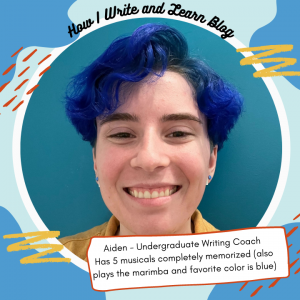In this new blog series, “Ask a Coach!” our Writing and Learning Center coaches answer our UNC-CH undergrads’ burning questions! Check back every month to see what our coaches have to say about everything from taking breaks to utilizing office hours!
What is the best way to prepare for my first exam?
 Aidan: I like to practice explaining the concepts to another person, or if need be, a stuffed animal. If I understand the concepts well enough to teach them, I am likely ready for the exam! For classes like math, econ, or really any class that has a bunch of numerical problems, I do as many practice problems as possible. In my experience with these classes, only reviewing notes is less helpful than employing active study strategies like teaching someone or doing practice problems. It’s useful to refresh on a concept, but if you don’t practice problems related to that concept, you won’t be much better off.
Aidan: I like to practice explaining the concepts to another person, or if need be, a stuffed animal. If I understand the concepts well enough to teach them, I am likely ready for the exam! For classes like math, econ, or really any class that has a bunch of numerical problems, I do as many practice problems as possible. In my experience with these classes, only reviewing notes is less helpful than employing active study strategies like teaching someone or doing practice problems. It’s useful to refresh on a concept, but if you don’t practice problems related to that concept, you won’t be much better off.
Sydney: First exams are tough. I think it helps to view your first exam as a learning opportunity. Ask people who have taken the class how they’ve prepared. Think about what studying techniques have worked best for you in the past. Be cognisant of what you do, when you do it, and how it goes. If the first exam doesn’t go as well as you would’ve liked, reevaluate those strategies and change them accordingly.
Aiden: If you’re unsure about how best to review and prepare, consider meeting with your instructor in office hours! Instructors aren’t going to tell you what exact questions will be on the exam, but they can talk with you about the best strategies to be ready for the exam, like going over class powerpoints, taking notes in a specific way, reviewing a certain aspect of the material, or more. It also encourages you to view the exam as something smaller within the context of the class as a whole which can help to reduce anxiety. If the exam is representative of the first month or so of the class, think of all the work you’ve done in that month to become familiar with the material, whether that’s smaller essays, readings, forum posts, or other similar things. Remind yourself that you’ve prepared through simply attending class and that you have spent lots of time doing homework and studying—if you can draw on that, you might find that you’re more prepared than you might think!
 Miranda: I think first planning how you are going to study can really help. Usually, with finals, you are having to balance so much that it is really overwhelming. Taking the time to break down each step of studying (yes, there are steps! For instance, review vs. practice) and when you will do it. Working backwards from when the exam is can really help give you time to also study. However, I really think active studying is key. This means, getting your brain to work not just reviewing (re-reading, skimming, and re-watching lectures). You need to practice what you have learned. And practice the exam format and types of questions so it feels familiar.
Miranda: I think first planning how you are going to study can really help. Usually, with finals, you are having to balance so much that it is really overwhelming. Taking the time to break down each step of studying (yes, there are steps! For instance, review vs. practice) and when you will do it. Working backwards from when the exam is can really help give you time to also study. However, I really think active studying is key. This means, getting your brain to work not just reviewing (re-reading, skimming, and re-watching lectures). You need to practice what you have learned. And practice the exam format and types of questions so it feels familiar.
This blog showcases the perspectives of UNC Chapel Hill community members learning and writing online. If you want to talk to a Writing and Learning Center coach about implementing strategies described in the blog, make an appointment with a writing coach, a peer tutor, or an academic coach today. Have an idea for a blog post about how you are learning and writing remotely? Contact us here.



